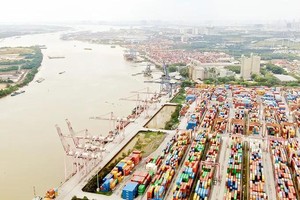
Lately, many online shop owners use authentic images of renowned trademarks to advertise for their merchandise, which is fake one with a much lower price compared to official outlets. These sellers normally aim at people who want to use branded goods at cheap prices. After receiving money via online payment methods, they send products without a certificate of origin.
The representative of L’Oréal Vietnam shared that the company has discovered several websites advertising its merchandise at a price of a few hundred thousand VND per item, which is great deal lower than the formal price.
Not long ago, the Department of Cyber Security and Hi-tech Crime Prevention (under the Ministry of Public Security) cooperated with Hanoi Agency of Market Surveillance to pay an unexpected visit to 5 warehouses of the two popular online shops, namely menshop79.com and Menshopfashion.com. They discovered over 2,000 fake items of various prestigious brand names like Gucci, Louis Vuitton, Hermes, Burberry, or Versace.
Aware of the complication of online shopping, Ms. Trinh Thi Thu H – a regular online buyer – shared that she dares not purchase any valuable item such as clothes, glasses, purses, or health-related goods via the Internet.
Officers from Market Surveillance Agencies reported that in order to file a lawsuit against fake merchandise selling, there must be valid proofs. Yet, most reported cases are online trades without clear invoices. In addition, e-commerce using social networks like Facebook or Zalo is very popular in Vietnam, but these platforms have no legal representatives in Vietnam to handle complaints from users.
Head of Vietnam Directorate of Market Surveillance Tran Huu Linh stated that there is much trouble in retrieving invoices of sold goods via e-commerce channels because his organization has no authority to request bank statements or documents of financial transactions of suspected people.
In reality, besides using normal shipping services to store and deliver their fake goods so that the market surveillance cannot check them, illegal sellers make full use of newly born e-commerce methods and also carry on with international trades in order to push their sales.
The above challenges have urged concerned state management units to quickly erase those vulnerabilities by issuing appropriate policies and legal documents to clearly encourage legitimate e-commerce activities in a healthy competition environment while introducing stricter punishments for law breakers.
In the recent national conference ‘Digital Economy – Effects, Opportunities, and Prospects of Vietnam’, co-held by Vietnam National University – Ho Chi Minh City and the Prime Minister’s Economic Consultation Team, Dr. Nguyen Duc Kiem said that the Politburo has already released Resolution No.52/2019 on guidelines to actively participate in Industry 4.0, in which digital economy development is the core.
Therefore, there should be guidance and corresponding regulations on international online trading, dispute handling, and online shop registration to ensure consumer rights. Also, legal documents related to fake goods prevention tasks, intelligence property protection must be released. They will contribute to a sustainable development of e-commerce in Vietnam.
According to reports on the index of Vietnamese e-commerce by Vietnam E-commerce Association (VECOM), there are millions of people taking part in e-commerce at the beginning of 2021. The development rate of e-commerce in 2019 was 32 percent, and the scale of retailed e-commerce trading reached US$11.5 billion.
Estimations show that in 2025, e-commerce in Vietnam will account for 10 percent of the GDP. This is a very promising future, as long as proper policies are released timely to maintain consumer confidence.
























